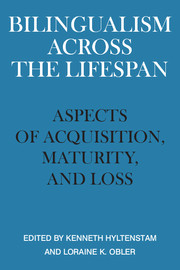Book contents
- Frontmatter
- Contents
- List of contributors
- Preface
- 1 Bilingualism across the lifespan: an introduction
- 2 Early differentiation of languages in bilingual children
- 3 Variation in children's ability to learn second languages
- 4 Idiomaticity as an indicator of second language proficiency
- 5 Prefabs, patterns and rules in interaction? Formulaic speech in adult learners' L2 Swedish
- 6 The imperfect conditional
- 7 Spanish, Japanese and Chinese speakers' acquisition of English relative clauses: new evidence for the headdirection parameter
- 8 Distinguishing language contact phenomena: evidence from Finnish–English bilingualism
- 9 The boustrophedal brain: laterality and dyslexia in bi-directional readers
- 10 Deterioration and creativity in childhood bilingualism
- 11 Crosslinguistic influence in language loss
- 12 Bilingualism in Alzheimer's dementia: two case studies
- 13 Language processing in the bilingual: evidence from language mixing
- Index
12 - Bilingualism in Alzheimer's dementia: two case studies
Published online by Cambridge University Press: 05 June 2012
- Frontmatter
- Contents
- List of contributors
- Preface
- 1 Bilingualism across the lifespan: an introduction
- 2 Early differentiation of languages in bilingual children
- 3 Variation in children's ability to learn second languages
- 4 Idiomaticity as an indicator of second language proficiency
- 5 Prefabs, patterns and rules in interaction? Formulaic speech in adult learners' L2 Swedish
- 6 The imperfect conditional
- 7 Spanish, Japanese and Chinese speakers' acquisition of English relative clauses: new evidence for the headdirection parameter
- 8 Distinguishing language contact phenomena: evidence from Finnish–English bilingualism
- 9 The boustrophedal brain: laterality and dyslexia in bi-directional readers
- 10 Deterioration and creativity in childhood bilingualism
- 11 Crosslinguistic influence in language loss
- 12 Bilingualism in Alzheimer's dementia: two case studies
- 13 Language processing in the bilingual: evidence from language mixing
- Index
Summary
Introduction
One of the most intriguing aspects of bilingualism which has increasingly come to interest researchers is the question of how a bilingual's languages are organized and processed psycholinguistically. In exploring this question, one major approach has been to analyze the pathological speech produced by bilingual aphasics, on the assumption that the types of linguistic breakdown observed there have important implications for how healthy language is organized and processed.
Case studies of bilingual aphasics have documented differential patterns of loss and recovery for each language – along with the more frequent case where both languages are affected in a like manner. Examples of language mixing in the aphasic have also been reported. Data of this type have been used to formulate neuro- and psycholinguistic models of bilingual system interaction (for reviews, see Paradis, 1983, 1977, and Albert and Obler, 1978).
In addition to bilingual aphasia, other neurological pathologies may also be used to elucidate the psycholinguistic functioning of bilinguals. Informal observations from demented bilingual speakers show that their linguistic and communicative behavior in each language may be differently affected in ways similar to that of aphasics. Specifically the demented bilingual may exhibit difficulties in choosing the appropriate language for the monolingual interlocutor, or upholding one language throughout the interaction.
- Type
- Chapter
- Information
- Bilingualism across the LifespanAspects of Acquisition, Maturity and Loss, pp. 202 - 226Publisher: Cambridge University PressPrint publication year: 1989
- 20
- Cited by



